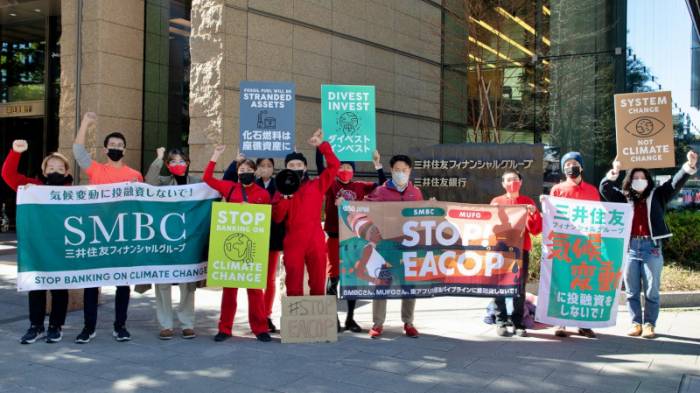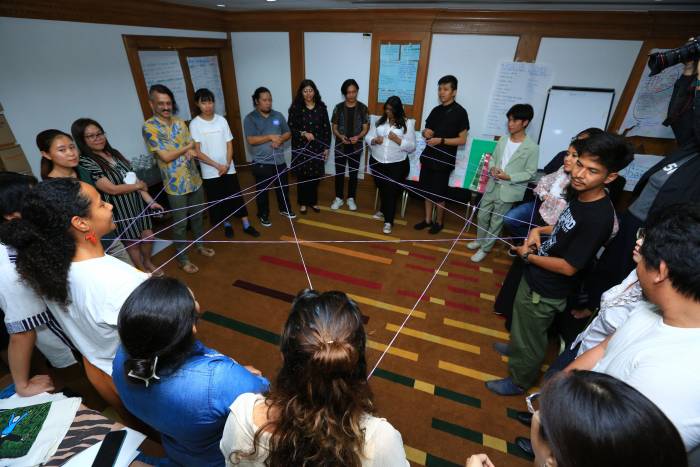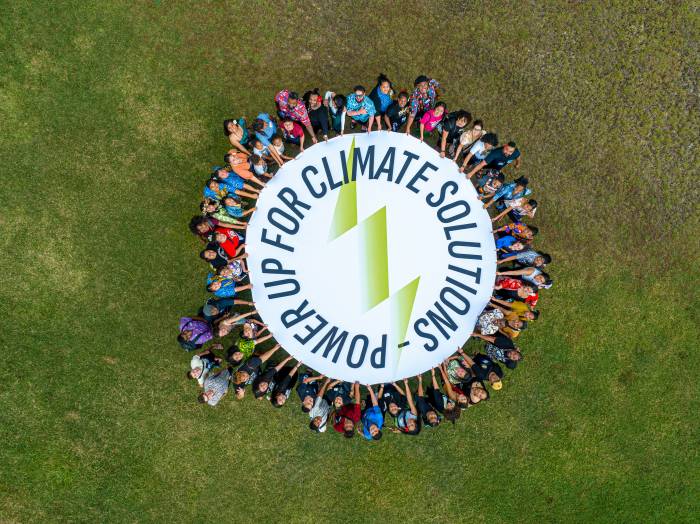Right now, the UN Climate Conference (COP28) is happening in Dubai and making headlines all around the world – bringing the climate crisis and the climate movement to center stage on the news and people’s attention. World leaders make statements and promises, the World Weather Organization sounds the alarm about climate impacts, and we get the megaphone to reach far and wide and help steer the conversation towards ambition and solutions rooted in justice.
This year COP started with some auspicious news: in the first day of the conference, the mechanisms for enacting the Loss and Damage Fund were agreed; and in the first weekend, 100+ countries announced their intention to triple renewable energy capacity by 2030 – both things we have been campaigning on and putting pressure for years, and great achievements for the climate movement.
But truth be told: as much as we value and believe in international cooperation, we don’t work all yearlong with COP in mind. For us at 350.org, putting power and agency at the hands of communities is the ultimate goal. COPs are just one stop in the road we build day by day, action by action, person by person. We work hard every and each day to change hearts and minds, redirect resources, exert pressure to increase political will to take the bold actions we so much need to stop what’s causing the climate crisis. And we do that in many ways, which frequently go unseen.
“The environmental group 350.org’s use of a ‘massive, sustained exercise of people power’ to demand action on climate change.”
– Article on Politico, November 2023
Recently, the book “Practical Radicals: Seven Strategies to Change the World,” co-authored by the progressive scholars Deepak Bhargava and Stephanie Luce, was published and mentioned 350.org as an example of how a creative and nimble group of passionate people can help change the status quo.
“I had always thought of the environmental movement, the mainstream environmental movement, as very kind of staid and playing by the rules and writing reports and making a case and doing traditional lobbying, and this [350.org] was just a bolt out of the blue in terms of the level of imagination it took and the risk that it entailed and the fact that it was being powered by young people who were going to fight for their future and not settle for politics as usual.”
– Deepak Bhargava, author of ‘Practical Radicals’
Read Politico’s article about the book and 350 here
The book focuses on strategies used by organizations and movements to achieve social change, suggesting tactics that can be replicated by others. So we thought it would be a good idea to share some of the strategies we used during 2023 to build people power and momentum to achieve the just renewable energy revolution:
1. Building pressure across continents:
We worked with activists, local communities and connect the dots between where the money to finance the fossil fuels industry comes from and where its impacts are most felt. We have shown that grassroots international cooperation and solidarity are stronger than fossil fuels’ greedy lobby – that people on the frontlines need to be heard and are not alone. This tactic has not only helped us reach headlines and influence public opinion, but has also led to very real results with banks, insurance companies and other institutions distancing themselves from fossil fuel projects.

An example of this kind of strategy being used is our work to stop the East Africa Crude Oil Pipeline (EACOP). If built, the pipeline would impact thousands in Uganda and Tanzania. But sustained pressure by our teams in Africa, Europe and Asia and together with many partners at the StopEACOP Coalition has made 27 banks drop their support to the project. We have organized international days of action, tours of local community members to other countries, online petitions and more.
2. Connecting activists through training and sharing:
The power of human connection cannot be underestimated, and at 350.org we believe that building community and collaboration are at the heart of any successful movement. That’s why we put a lot of energy into organizing webinars and workshops, providing training resources for people to organize local groups in their communities and creating networks where activists know more about each other’s fights and work together.

An example of this kind of strategy being used is our Asia Solidarity Lab, which has happened for the 3rd time now in 2023. The Lab is a dynamic platform that brings together amazing activists, thinkers, and artists from across Asia to address critical social and political issues. It’s a space for meaningful dialogue, collaboration, and creativity – this year with a special focus on “Training and Facilitation” so that this model can be replicated to reach even more people.
3. Powering up distributed organizing for a common goal:
Something learned throughout our 16 years is that synergy is really powerful. Bringing big numbers to the streets or getting thousands of people joining online actions is meaningful, for sure. But a lot of the work also happens every day, rooted in our local realities and within our small groups. 350 works with hundreds of local groups and communities around the world – and when those groups come together in an unified call, nobody can ignore it.

An example of this kind of strategy in use is our “Power Up” global month of actions. To honor the continuous work of the local groups in our network and the power of common goals, just before COP28 started we held over 220 events in 66 countries, and it was a resounding success. From Los Angeles to Nepal, together we motivated people worldwide to unite, demanding a massive scaling up of renewable energy, and a shift away from fossil fuels.
These are just some examples of the several tactics we used to achieve the change we want to see. Throughout the year, we organized and joined hundreds of actions, bringing together experienced activists and newcomers, workers and unions, traditional communities, all of us.
We need to come together and demonstrate our power, now and every day!